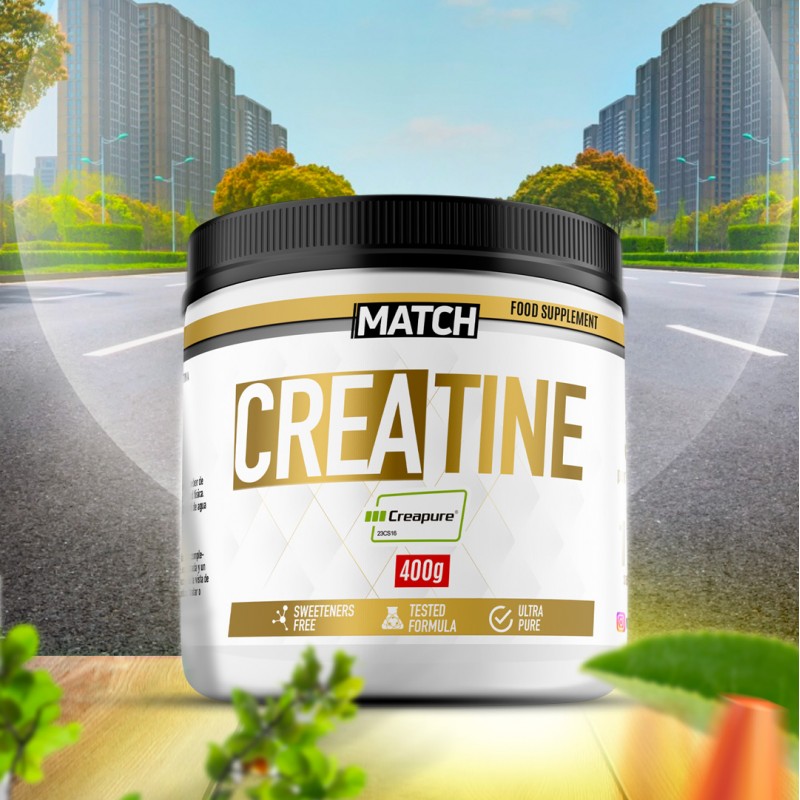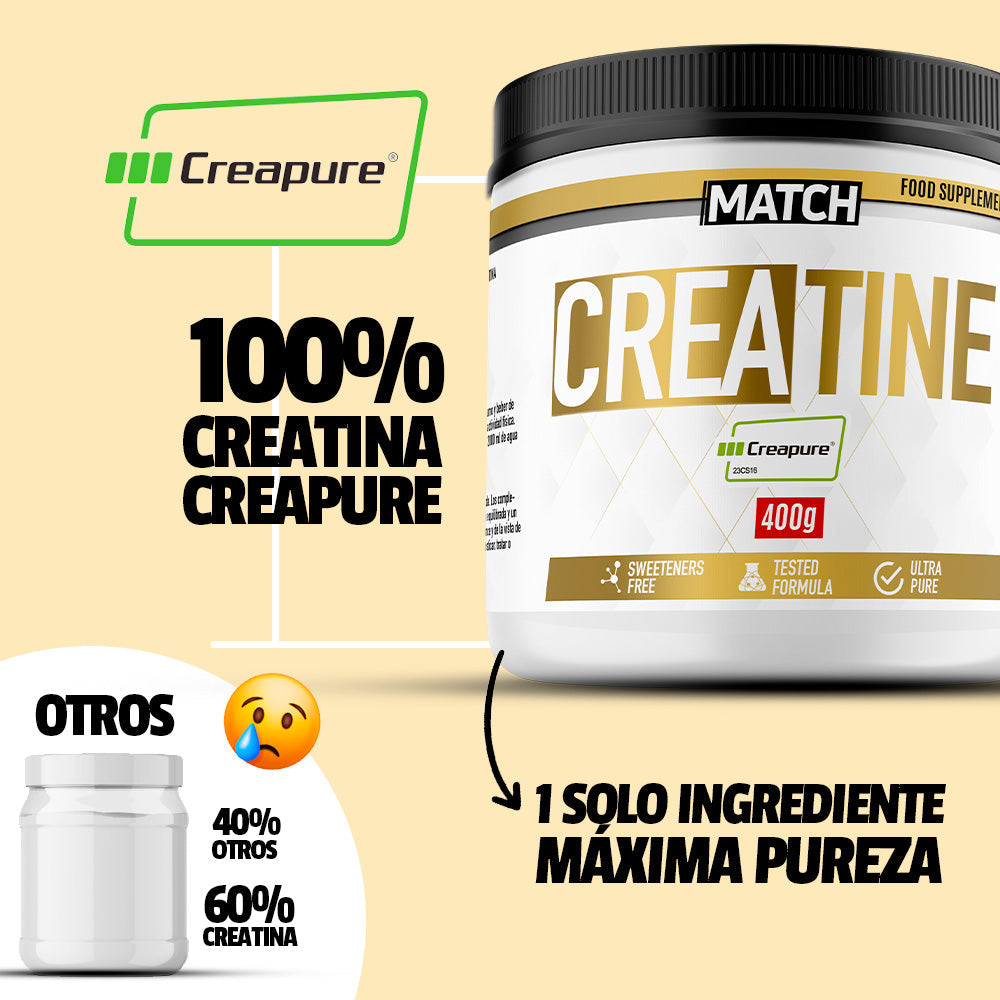Creatine (Creapure®) 400g
Creatine (Creapure®) 400g
Creatine's main role is to act as a rapid source of energy for muscle cells during high-intensity, short-duration exercise, such as weightlifting or sprinting. Creatine is stored in muscles as phosphocreatine, which is used to regenerate adenosine triphosphate (ATP), the primary source of cellular energy.
In addition to being produced by the body, creatine is also obtained through diet, primarily through the consumption of meat and fish. However, the amount of creatine in food is often insufficient to provide additional benefits to athletes or people seeking to improve their physical performance.
Creatine supplementation has been shown to be effective in improving athletic performance, increasing strength and muscle mass, and improving recovery from certain types of exercise. However, it's important to note that the response to creatine can vary among individuals, and it's advisable to consult a healthcare professional before starting creatine, especially if you have a preexisting medical condition or are taking medication.
SOME BENEFITS OF CREATINE
Increased muscle strength
Creapure® helps improve strength and power by increasing the availability of phosphocreatine in the muscles, allowing for greater ATP regeneration during high-intensity exercise.
Improved athletic performance
Creatine may improve performance in activities that require short, powerful bursts of energy, such as weightlifting, sprints, and team sports.
Increased muscle mass
Creatine may promote muscle hypertrophy by increasing protein synthesis and cell volume through hydration.
Improved recovery
Supplementing with Creapure® can reduce muscle fatigue and soreness, thus improving recovery after exercise.
Greater work capacity
Creatine allows muscles to work harder and longer, which can improve work capacity and overall performance.
Neuroprotective effects
Creatine has been shown to have neuroprotective effects in preclinical studies, although further human research is needed to confirm these results.
Potential to improve cognitive function
Some studies suggest that creatine may improve cognitive function, especially in tasks requiring short-term memory and information processing skills.
Management of neuromuscular diseases
Creatine may have a positive effect on neuromuscular diseases, such as muscular dystrophy and amyotrophic lateral sclerosis (ALS), by reducing fatigue and improving muscle function.
Possible benefits in aging
Creatine may help maintain muscle strength and function in older adults, which could improve quality of life and delay the onset of age-related frailty.
IS CREATINE SAFE?
Creatine supplementation has been widely studied in scientific circles (perhaps more so than any other supplement, with the exception of protein powders). Science generally considers creatine to be safe and effective, and when taken correctly, it delivers on its promise of strength and muscle gains.
Although some research has suggested creatine's effectiveness for high-intensity explosive exercises, such as sprinting, overall results have been mixed.
For what type of sport is creatine most recommended?
Creatine is a supplement that can be beneficial for a wide range of sports and physical activities. However, it has been shown to be most effective for sports that involve short, powerful bursts of energy, such as weightlifting, sprinting, jumping, and team sports that require short, high-intensity efforts.
Additionally, creatine may be useful for endurance sports, such as cycling, swimming, and rowing, by improving recovery after exercise and reducing muscle fatigue.
In short, creatine is a supplement that can be beneficial for a wide variety of sports and physical activities, especially those involving high-intensity, short-duration efforts. However, it's important to note that individual responses to creatine can vary, and it's advisable to consult with a healthcare professional before starting to take it, especially if you have a preexisting medical condition or are taking medication.
Will I gain muscle by taking creatine?
Creatine is a supplement that can help increase strength and muscle mass during training. Taking creatine has been shown to improve athletic performance by 10–15%.
However, it's important to keep in mind that creatine is not a substitute for a healthy diet and regular exercise. These factors are the foundation for achieving the best training results and maximizing the effects of creatine.
Creatine can be especially useful for overcoming performance plateaus, allowing you to increase training weight and optimize muscle growth. However, the time it takes to increase muscle mass varies from person to person and depends on factors such as gender, age, and training level.
How much creatine should I consume per day?
There are several guidelines for creatine consumption: while some suggest a maximum of 0.1g of creatine per kg of body weight, more health-focused trends suggest 3g per day.
It's important to note that weight gain can be a side effect of creatine intake, as it can cause water retention in the body. The amount of water retained varies from person to person and depends on the amount of creatine consumed.
In general, the more creatine you ingest, the greater the likelihood of water retention.
Who can benefit from creatine?
Creatine is a widely used and beneficial supplement for a wide variety of athletes and sportspeople due to its ability to improve athletic performance, increase strength and muscle mass, and accelerate recovery. Below are some of the ways creatine can benefit athletes and sportspeople:
High-intensity exercise: Creatine is especially effective at improving performance in high-intensity, short-duration activities, such as weightlifting, sprinting, and power sports. Creatine helps increase energy availability in muscles by increasing phosphocreatine levels, allowing athletes to perform more intense efforts and recover faster between sets and sprints.
Strength and muscle mass gains: Creatine supplementation has consistently been shown to increase strength and muscle mass in athletes and sportspeople. Creatine can improve protein synthesis, promote cellular hydration, and stimulate the release of growth factors, which may contribute to muscle growth and training adaptation.
Recovery: Creatine may also help speed recovery after exercise, which is especially important for athletes who participate in intensive training or frequent competitions. Creatine may reduce muscle damage, decrease inflammation, and improve muscle glycogen resynthesis, which can result in faster recovery and increased training tolerance.
Team sports and aerobic activities: Although creatine is best known for improving performance in anaerobic activities, it may also be useful in team sports and intermittent high-intensity aerobic activities, such as soccer, basketball, and cycling. Creatine may improve athletes' ability to perform repeated sprints, change direction quickly, and maintain a high level of performance for extended periods.
In short, creatine is a valuable supplement for a wide variety of athletes and sportspeople, with benefits ranging from improving athletic performance to increasing strength and muscle mass and speeding up recovery.
No hay información nutricional disponible.

















